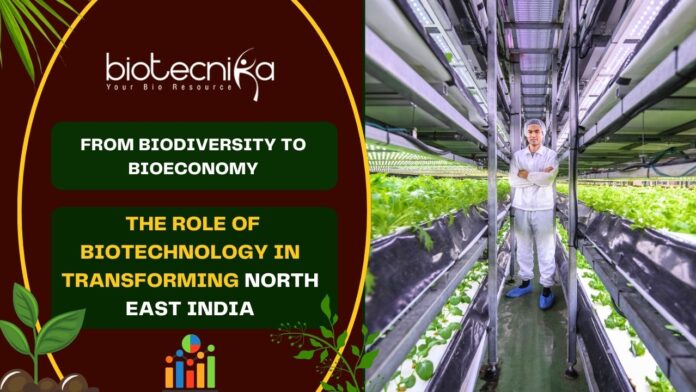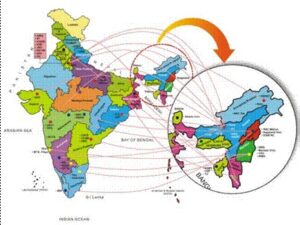From Biodiversity to Bioeconomy: The Role of Biotechnology in Transforming North East India
Unlocking the Potential of North East India
Nestled within the majestic Himalayas and enriched with a wealth of biodiversity, India’s NER (North East Region) is a land of immense promise. Its diverse landscapes, abundant natural resources, and rich cultural heritage present unique opportunities for innovation. At present, biotechnology is playing a crucial role in not only preserving the region’s ecological wealth but also in fostering sustainable development and economic progress.
A New Era of Agricultural and Scientific Advancement
Envision a scenario where farmers cultivate medicinal herbs that boost both the healthcare industry and local economies. Imagine bright young scientists developing crops that can withstand harsh climates and ecopreneurs turning traditional wisdom into marketable products. These possibilities are becoming realities through the Department of Biotechnology’s North Eastern Programme, which is dedicated to driving scientific growth in the region.
The Department of Biotechnology (DBT) has been proactively promoting scientific innovations since 2010. It has invested a significant portion of its annual funding to initiatives in the North East. These initiatives aim to leverage the region’s biological wealth, enhance biotechnology education, and create employment opportunities through bio-based entrepreneurship.
Key Biotechnology Initiatives in NER
Twinning R&D Programme
The Twinning R&D (Research & Development) Programme was launched in the years 2010-2011. This program was meant to build research capacity in Biotechnology through collaborations between the leading Research organizations and companies across India as well as North Eastern Institutions. To date, it has facilitated more than 650 Research projects, which have benefitted over 2,000 young Researchers as well as 450 Scientists.
Biotech Hub Establishment
Since 2011, to strengthen the Scientific infrastructure, around 126 Biotechnology Hubs have been set up in Educational Institutions across the NER. These Scientific hubs provide training in supporting education, advanced and futuristic technologies, as well as Research in Biological Sciences. In its second phase, 54 additional Scientific hubs have been established to focus on region-specific scientific challenges.
Biotechnology Labs in Schools (BLiSS)
BLiSS was launched in the year 2014. This initiative aims to promote interest in Biological Sciences among school students by providing well-equipped laboratories in secondary schools across the region.
Visiting Research Professorship Programme
Since 2015, the Visiting Research Professorship Programme has brought distinguished scientists to the region, enriching Biotechnology Research as well as education in various institutions.
Specialized Training and Research Collaborations
- The Chemical Ecology Programme, initiated in collaboration with Bangalore-based research institutes in 2015, provides interdisciplinary training to young scientists.
- The Genomics-Driven Research in Human Health Programme, launched in 2016, trains clinicians as well as researchers in Molecular and Genetic Analysis.
Biotechnology for Farmers and Local Entrepreneurs
Biotechnology is also helping businesses as well as local farmers through projects that support Sustainable resource utilization and Agricultural advancements.
- DBT-North East Centre for Agricultural Biotechnology: Supports farming communities by improving agricultural research.
- Citrus Research Programme: Helps develop disease-resistant citrus varieties and promotes commercial citrus farming.
- Medicinal Crop Cultivation: Encourages the growth of high-value medicinal plants like turmeric and lemongrass, benefitting hundreds of farmers.
- Essential Oil Production: In Arunachal Pradesh, a distillation unit set up to empower local farmers to extract and sell essential oils, increasing their incomes.
- Value Addition for Wild Fruits: Efforts are underway to transform local fruits such as Assam apple into marketable products like jam and juice, creating new revenue streams for rural communities.
Notable Achievements in Biotechnology
- Development of Disease-Resistant Crops: Scientists in Assam have developed a bacterial blight-resistant rice variety, “Patkai,” which enhances crop yield and resilience.
- Innovative Diagnostic Tools: A lateral flow assay has been created for the rapid detection of brucellosis in livestock.
- Pig Disease Diagnosis Mobile App: A user-friendly mobile application has been launched to assist farmers as well as veterinarians in diagnosing pig diseases.
Conclusion
By integrating scientific innovation with basic knowledge, biotech is transforming the economic landscape of North East India. Government initiatives are driving sustainable growth by empowering local communities through education, research as well as entrepreneurship. As North East India rises as a hub for bio-innovation, it showcases the powerful synergy between technology and tradition in building a prosperous and sustainable future.
Biotechnology in North East India































